Dil dixwaze here cengê
Rext û tifinga min bîne
Dil dixwaze here cengê
Rext û Keleşa min bîne
Dayê welat Kurdistane
Li ber dilê me şirîne
Evîna wî pir girane
Ma tu nabînî rengê wê
Dayê heger ez şehîd bibim
Hêsrê çavan nebarîne
Serbest here nav civaka
Serbilind û bililîne
Dil dixwaze here cengê
Rext û tifinga min bîne
Dil dixwaze here cengê
Rext û Keleşa min bîne.
Rext û tifinga min bîne
Dil dixwaze here cengê
Rext û Keleşa min bîne
Dayê welat Kurdistane
Li ber dilê me şirîne
Evîna wî pir girane
Ma tu nabînî rengê wê
Dayê heger ez şehîd bibim
Hêsrê çavan nebarîne
Serbest here nav civaka
Serbilind û bililîne
Dil dixwaze here cengê
Rext û tifinga min bîne
Dil dixwaze here cengê
Rext û Keleşa min bîne.
envoyé par CCG/AWS Staff - 19/2/2015 - 20:53
Langue: allemand
Traduzione tedesca / Deutsche Uebersetzung
da questa pagina
Aus dieser Seite
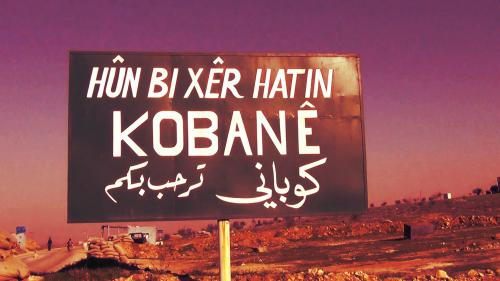
La traduzione viene riportata con alcuni interventi: per prima cosa sono state eliminate le "varianti tra parentesi" proposte dal traduttore (che sembra essere tale Xerîb), che comunque possono essere consultante cliccando sul link alla pagina originale. Delle varianti è stata qui accolta solo quella per l' "arma" (Waffe), che appare essere il Kalashnikov. [RV]
da questa pagina
Aus dieser Seite

"Benvenuti a Kobanê" / "Willkommen in Kobanê".
La traduzione viene riportata con alcuni interventi: per prima cosa sono state eliminate le "varianti tra parentesi" proposte dal traduttore (che sembra essere tale Xerîb), che comunque possono essere consultante cliccando sul link alla pagina originale. Delle varianti è stata qui accolta solo quella per l' "arma" (Waffe), che appare essere il Kalashnikov. [RV]
DAS HERZ MÖCHTE IN DEN KAMPF ZIEHEN
Das Herz möchte in den Kampf ziehen,
hol meinen Patronengürtel und mein Gewähr
Das Herz möchte in den Kampf ziehen
hol meinen Patronengürtel und mein Kalashnikow
Mutter die Heimat ist Kurdistan
in unserem Herzen sehr süß,
die Liebe zu ihr sehr groß,
siehst du denn nicht ihre Farben
Mutter, sollte ich als Märtyrer fallen,
Vergiße keine Tränen,
gehe sorgenfrei unter Menschen
mit erhobenem Haupt und singe ein Halleluja
Das Herz möchte in den Kampf ziehen,
hol meinen Patronengürtel und mein Gewähr
Das Herz möchte in den Kampf ziehen
hol meinen Patronengürtel und mein Kalashnikow.
Das Herz möchte in den Kampf ziehen,
hol meinen Patronengürtel und mein Gewähr
Das Herz möchte in den Kampf ziehen
hol meinen Patronengürtel und mein Kalashnikow
Mutter die Heimat ist Kurdistan
in unserem Herzen sehr süß,
die Liebe zu ihr sehr groß,
siehst du denn nicht ihre Farben
Mutter, sollte ich als Märtyrer fallen,
Vergiße keine Tränen,
gehe sorgenfrei unter Menschen
mit erhobenem Haupt und singe ein Halleluja
Das Herz möchte in den Kampf ziehen,
hol meinen Patronengürtel und mein Gewähr
Das Herz möchte in den Kampf ziehen
hol meinen Patronengürtel und mein Kalashnikow.
envoyé par Riccardo Venturi - 19/2/2015 - 20:55
Langue: italien
IL CUORE VORREBBE ANDARE IN BATTAGLIA
Il cuore vorrebbe andare in battaglia,
dammi il cinturone ed il fucile
il cuore vorrebbe andare in battaglia
dammi il cinturone ed il Kalashnikov
Madre, la patria, il Kurdistan
nel nostro cuore ci è dolcissima,
l'amore che le portiamo è enorme,
allora, non vedi i suoi colori?
Madre, se dovessi cadere come martire
non versare alcuna lacrima,
vai senza pena tra la gente
a testa alta e canta un'alleluja
Il cuore vorrebbe andare in battaglia,
dammi il cinturone ed il fucile
il cuore vorrebbe andare in battaglia
dammi il cinturone ed il Kalashnikov.
Il cuore vorrebbe andare in battaglia,
dammi il cinturone ed il fucile
il cuore vorrebbe andare in battaglia
dammi il cinturone ed il Kalashnikov
Madre, la patria, il Kurdistan
nel nostro cuore ci è dolcissima,
l'amore che le portiamo è enorme,
allora, non vedi i suoi colori?
Madre, se dovessi cadere come martire
non versare alcuna lacrima,
vai senza pena tra la gente
a testa alta e canta un'alleluja
Il cuore vorrebbe andare in battaglia,
dammi il cinturone ed il fucile
il cuore vorrebbe andare in battaglia
dammi il cinturone ed il Kalashnikov.
Langue: anglais
English translation by Riccardo Venturi
February 24, 2015
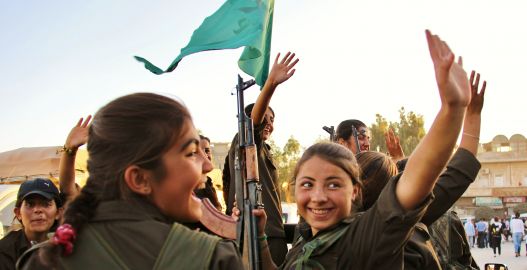
February 24, 2015

MY HEART IS PLEASED TO FIGHT
My heart is pleased to fight,
so give me my belt and my gun
my heart is pleased to fight,
so give me my belt and my Kalashnikov.
Mother, Kurdistan, our fatherland
is so sweet in our hearts,
upon it do we bestow so much love,
so, don't you see its colours?
Mother, should I fall as a martyr
please don't shed tears for me,
you'll go among the people without sorrow,
holding your head high and singing an hallelujah.
My heart is pleased to fight,
so give me my belt and my gun
my heart is pleased to fight,
so give me my belt and my Kalashnikov.
My heart is pleased to fight,
so give me my belt and my gun
my heart is pleased to fight,
so give me my belt and my Kalashnikov.
Mother, Kurdistan, our fatherland
is so sweet in our hearts,
upon it do we bestow so much love,
so, don't you see its colours?
Mother, should I fall as a martyr
please don't shed tears for me,
you'll go among the people without sorrow,
holding your head high and singing an hallelujah.
My heart is pleased to fight,
so give me my belt and my gun
my heart is pleased to fight,
so give me my belt and my Kalashnikov.
×
![]()

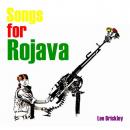
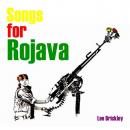

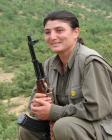


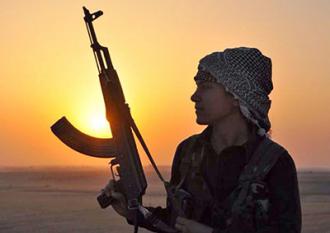
Although little or nothing is known about Şehid Delîla and Koma Amara, and still less about the song they sing (now widespread in the Web), we can say it is a battle song from Kobanê and Rojava liberation struggle (“Rojava” means “West, Western Side” in Kurdish). So, we shouldn't expect a typical “antiwar song”, but a song calling to the battle that brought to the liberation of the city from the besiegers of the “Islamic State” on January 26, 2015. The Kurdish lyrics could be interpreted by means of a German translation we fortuitously found in the Web. Of course, anybody knowing more both about the song the its authors, if any, is warmly welcome. As the song is sung by two women, it refers probably to the “Rojava girls” who fought bravely to liberate Kobanê from the ISIS fascist thugs. [RV]